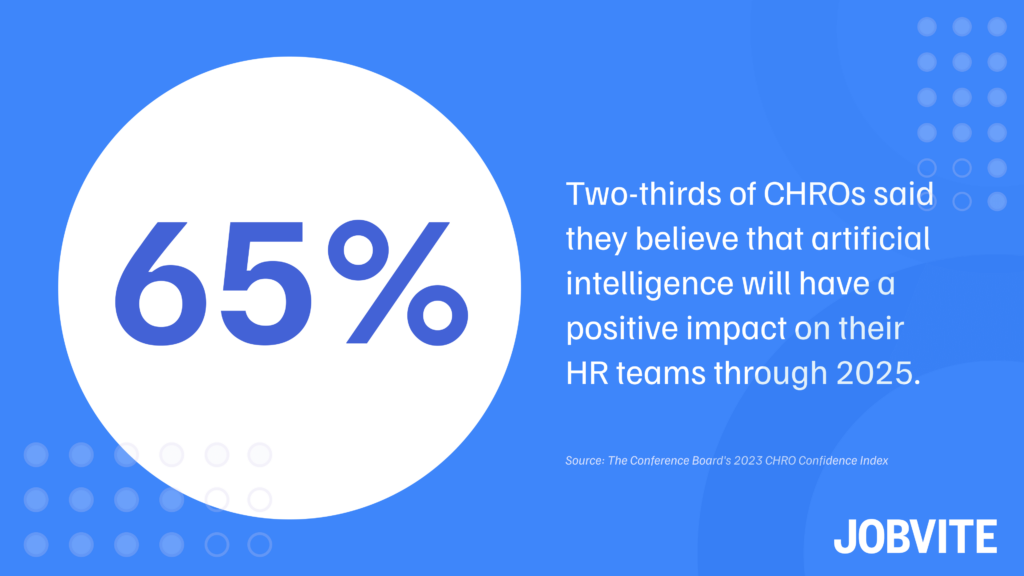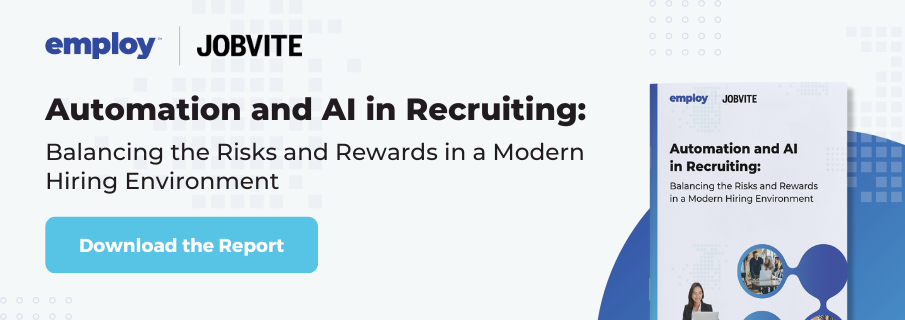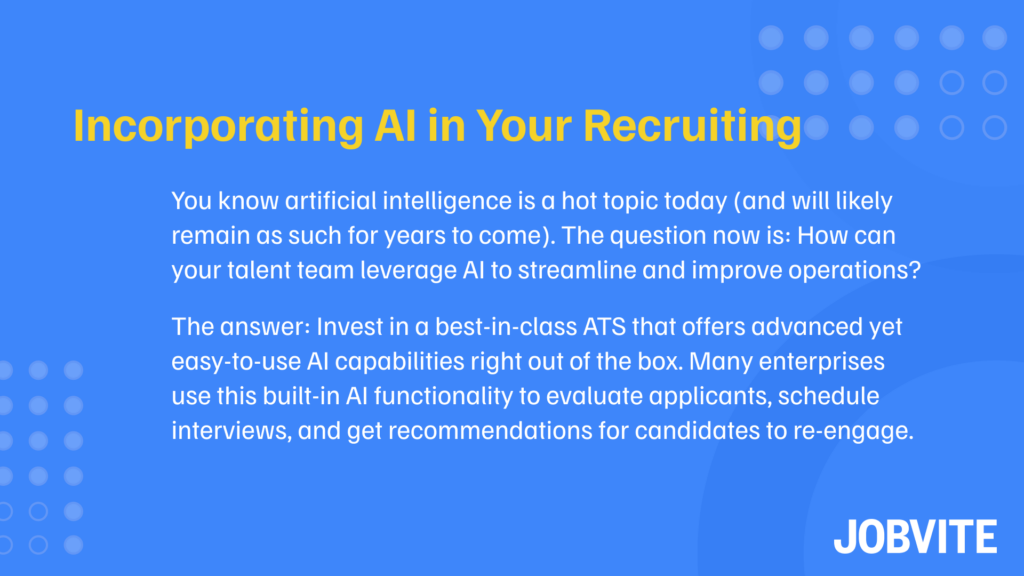The business climate and labor market are changing at a rapid pace — as is the way employers hire top talent. It’s little wonder then that artificial intelligence is quickly becoming a key component of talent acquisition, as more and more companies incorporate AI in their recruiting strategies.
The rapid rise of AI often leads TA professionals to ask two key questions:
- 1) How are enterprise talent teams leveraging AI capabilities in their recruitment efforts?
- 2) And what specific type of AI technology are they investing in to enhance their hiring?
The answer to both Qs is essentially the same: Leading enterprises are turning to applicant tracking systems (ATS) with native AI features to help them tackle some of the toughest and trickiest activities associated with their daily recruitment efforts — not a set of disparate AI tools.
If you’ve long wanted to know whether AI is really deserving of the hype (in short, it is) and how your recruiting staff can use it to streamline various facets of their work, you’ve come to the right place.

The (increasing) power of AI in recruiting
Before we go any further, let’s be clear: Artificial intelligence isn’t a silver-bullet solution of sorts for your talent acquisition strategy. The human element will always be crucial to attracting, engaging, and converting qualified candidates and ensuring personal relationships are built with top talent.
“[Employers] must … strike a balance between AI’s ability to streamline recruitment processes and the need for human intervention at crucial stages of the recruitment process,” our Automation and AI in Recruiting report found. (Translation? Your recruiters won’t become irrelevant anytime soon.)
With that caveat out of the way, AI in recruiting is becoming increasingly popular for a reason:
Artificial intelligence and machine learning are transforming the way talent teams source, nurture, interview, evaluate, and rediscover premier prospects — and, thereby, improving employers’ hiring speed and efficiency.
Look no further for proof of the power of AI than Jobvite customer GroupM.
“The use of AI in the talent industry will continue to change our roles in the [coming] years,” said former GroupM Group Talent Manager Jennifer Gabrielle-Chapman.
“Jobvite understands that and automates a lot of the groundwork, such as managing data or confirming interview details,” Jennifer continued. “This allows our talent team to be more client-facing and focus on the aspects of our work that requires nuance and human interaction.”
Managing data and confirming interviews, of course, are just two specific examples of AI in action for today’s recruiting orgs. Some other popular use cases for artificial intelligence in TA include:
Screening candidates more quickly and efficiently
With AI recruitment tools, however, tedious and time-consuming manual screening of resumes is replaced by intelligent algorithms that rapidly review a lead’s suitability based on job descriptions.
Apart from improving efficiency, AI recruiting tools also ensure a higher quality of candidates entering the interview stage (and, in turn, a greater quality of hire for selected prospects).
That means recruiters and talent acquisition professionals can put one arduous repetitive task on relative autopilot, save time in their day, and turn their attention to other essential TA activities: pipeline analysis, nurture campaign optimization, candidate feedback collection — the list goes on.
Writing and optimizing impact job descriptions
Attracting the right job candidates begins with crafting a compelling and inclusive job description.
Artificial intelligence tools analyze and improve job descriptions by eliminating biased language and providing suggestions to make them more appealing to a wider audience. Improved job descriptions lead to a greater diversity of applicants, ultimately benefiting the organization as a whole.

Enhancing the quality of candidate experience
The impact artificial intelligence has on the candidate experience provided to each job seeker is transformative: from the job application process to the interview and onboarding processes.
Chatbots, for instance, can assist job seekers with their queries about the company and application process, making the experience more engaging and preventing applicants from dropping off.
Reducing unconscious bias in the hiring process
Despite attempts to reduce bias in recruiting, unconscious biases still plague hiring decisions.
Enter AI recruitment software, which addresses this issue head-on by incorporating algorithms that assess candidates solely on their qualifications and experience. By minimizing the impact of bias in the hiring process, AI tools help ensure a fair and meritocratic selection of candidates.
Automating repetitive talent acquisition tasks
Arguably the biggest pro of AI ties into automation. Eliminating the need for repetitive, manual labor is one of the most significant ways AI recruiting tech is revolutionizing talent acquisition today.
Many AI-powered tools handle tasks like data entry and talent sourcing. By automating these tasks, human recruiters can focus on higher-level responsibilities that drive strategic growth.

Investing in an ATS to aid with AI in recruiting
Traditionally, recruiters and talent acquisition pros have relied on manual processes to find, screen, and qualify candidates. Unfortunately, this approach can be time- and resource-intensive and prone to bias. Thanks to AI in recruiting, some of these TA challenges can be alleviated — and automated.
The key is onboarding the optimal AI recruiting technology.
As noted, an advanced ATS with artificial intelligence and automation capabilities can take time-consuming tasks off your talent team’s plate and enable them to focus on other important work.
With that in mind, here’s what to look ATS with advanced (yet easy-to-use) AI functionality:
- Intelligent candidate sourcing: Using AI-powered sourcing tools, talent team’s can quickly identify top-quality candidates from talent pools and job boards. These tools use algorithms to analyze large amounts of data to find candidates with the best potential fit for your org’s open roles.
- Application and resume screening: AI can help sort through large volumes of applications, identifying strong candidates based on specific criteria, including role qualifications, experience, skills, certifications, and more. This results in time saved for the sourcers and hiring managers.
- Streamlined interview scheduling: Chatbots powered by AI can assist by automating comms with candidates, resulting in quicker responses and reduced scheduling challenges. Jobvite also offers Smart Self-Scheduling to enable recruiters to easily access interview panelists’ calendars. Users are then presented the ideal next open slots, thanks to our built-in AI functionality.
- Enhancing diversity and inclusion: Another AI use case is decreasing human biases in the recruiting process to ensure high-quality diverse candidates are assessed based solely on their experience rather than surface-level traits — leading to a more inclusive and innovative workforce.
To get started with incorporating AI in your recruiting process, simply follow these four steps:
- Determine the specific challenges and use cases you want AI to address
- Set specific and realistic goals for each recruiters and your TA team at large
- Evaluate solutions and platforms, and speak with ATS vendors of interest
- Implement a pilot program to ensure AI actually does what you want it to
Bottom line: Infusing AI into your recruiting strategy better positions your talent acquisition team to help achieve your org’s hiring goals and streamline your TA specialists’ day-to-day duties.
Ready to get started with AI for recruiting? Learn all about the out-of-the-box artificial intelligence functionality in Jobvite’s enterprise ATS. Schedule your demo today.





